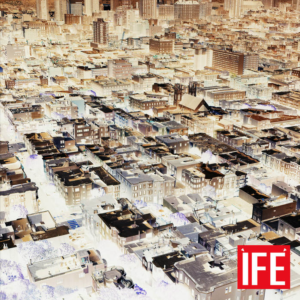 The compelling, hypnotic second album from percussionist-composer-DJ-producer Otura Mun, a.k.a. ÌFÉ, begins and ends in New Orleans, where he has lived for only a year now after moving from Puerto Rico. The brief opening invocation, “Preludio II,” features New Orleans singer Lex against an electronic backdrop. And “Closing Prayer” has one of the city’s percussion luminaries, Bill Summers, joining Mun on a variety of drums.
The compelling, hypnotic second album from percussionist-composer-DJ-producer Otura Mun, a.k.a. ÌFÉ, begins and ends in New Orleans, where he has lived for only a year now after moving from Puerto Rico. The brief opening invocation, “Preludio II,” features New Orleans singer Lex against an electronic backdrop. And “Closing Prayer” has one of the city’s percussion luminaries, Bill Summers, joining Mun on a variety of drums.
But in between those is a bracing set inspired by the journey Mun made from the Caribbean to New Orleans, bringing African-rooted musical traditions and spiritual/cultural practices with him. More than that, though, it echoes and honors the similar journeys countless others made through several centuries, whether forced or freely.
Of course, Mun’s path is not like others’, starting in Indiana (where he was born Mark Underwood and raised in a Mennonite family) and moving to Texas (where he held a coveted spot in the vaunted UT drum line) before he almost serendipitously landed in San Juan, where he embraced the culture deeply, becoming a priest in the Yoruban Ifá religious community. And if the album’s title (along with its 2017 predecessor, 1111+1111) might be seen as referencing a digital component, Mun explains that these come from prophetic Ifá numeric codes and are in fact pronounced yah-koon may-yee (the new one, evoking the “birth of night and fearless embrace of death”) and edgy-og-bay (the debut).
That is the thread here, encoded itself in the drums and percussion that mark nearly all of the songs—burbling here, pulsing there, even marching in some places (once a drum line member, always a drum line member). Those sounds anchor a variety of combinations of vocals and electronics—and electronically altered vocals. The result is often a compelling spiritual/secular blend, though Mun will certainly argue that it is all spiritual, whether “Voodoo Economics” or “Mr. Envy,” an indictment of the competitiveness engendered via social media.
And while Afro-Caribbean via New Orleans is the focus, the consciousness is informed by the larger picture of the African diaspora in the modern world. This is embodied explicitly in Robby the Lord, from Paris’ Congolese community, who is given the spotlight on “Fake Blood,” which questions reactions to such events as the mass shooting in Las Vegas in 2017, and by the Yoruban-rooted London Lucumi Choir, featured on “Closing Prayer.”
As such, this is less like the rara/second-line collaborations from Haiti-based Lakou Mizik with New Orleans artists, and more like the Afrobeats movement of West Africa, which has launched Nigeria’s reigning global music Grammy Award-winner Burna Boy and others to international renown. More so, this album, as strong as it is, seems only the first exploration of the possibilities awaiting as Mun further explores and connects with New Orleans’ rich musical underground.




